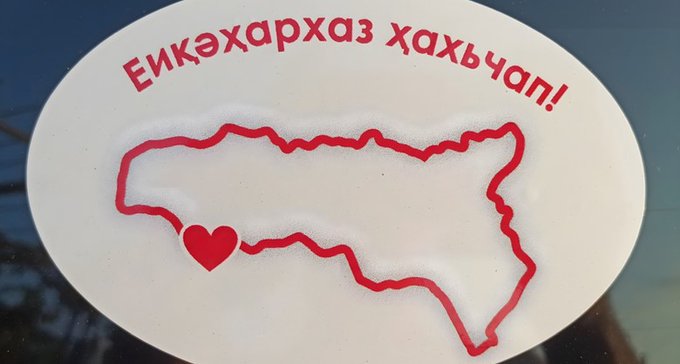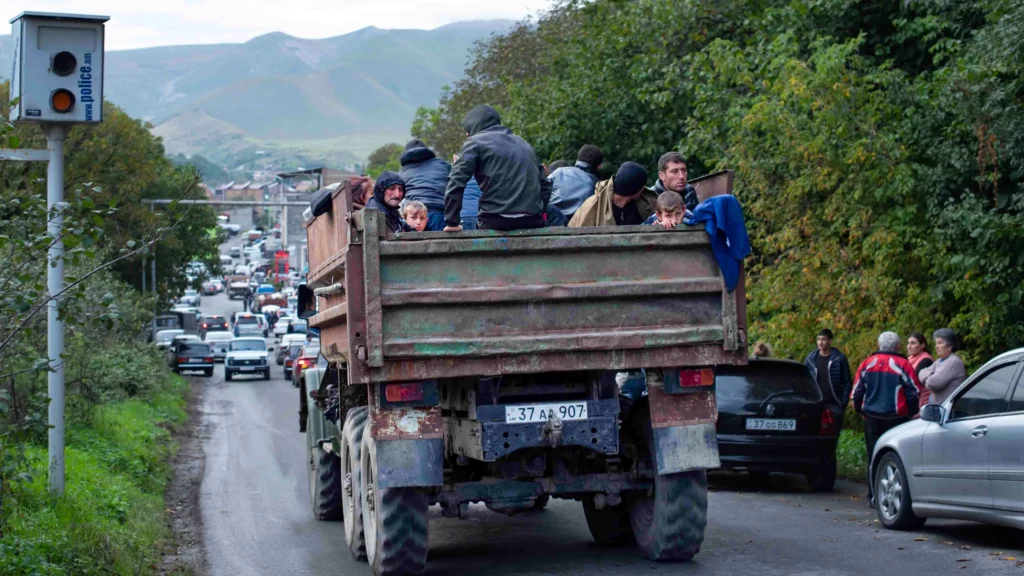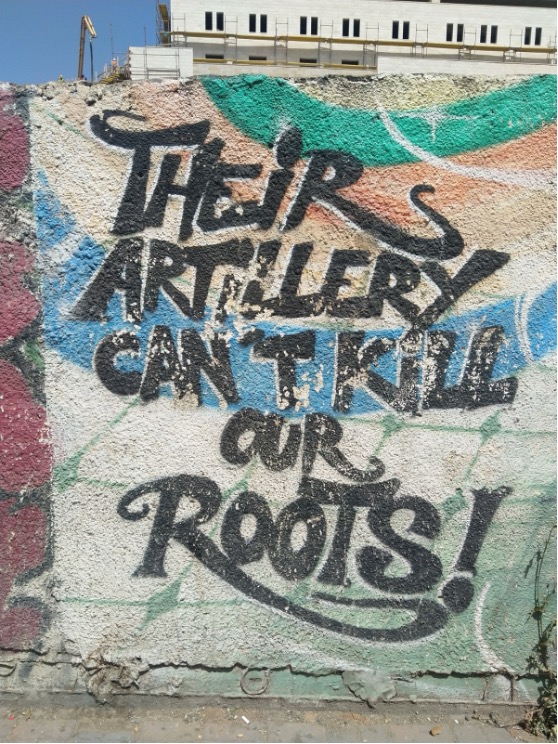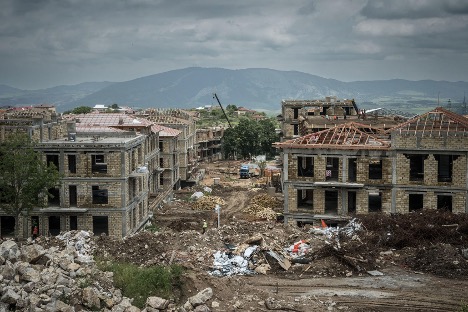A Friend with a Demand: The Issue of Pitsunda Dacha in Abkhazia-Russia Relations
The Abkhazian Parliament faces a difficult decision just after 6 months of its election (March 26, 2022) regarding an agreement signed secretly between Abkhazia and Russia. It is unclear how many people were initially aware of the plan to transfer the Pitsunda state dacha to Russia, along with 185 hectares of premium Abkhazian soil surrounding it. Although this might be a minor issue in the grand political scheme of the Russian Federation, it has created an outcry in the small Abkhazian society since the public learned about the agreement on July 11, six months after its initial signing on January 19, 2022.
While the Abkhazian people have voiced their clear opposition against the ratification of the agreement in the Abkhazian Parliament, the President of Abkhazia Aslan Bzhania and the Russian side insist that this is a vital agreement in ensuring Russia’s military and economic support to the de facto state. However, this is not an issue that emerged out of the blue in the past few months. When we take a step back to observe the larger picture, the ban on foreigners to obtain Abkhazian real estate has come to the forefront of Abkhazian and Russian relations countless times and was recently included in a larger list of Russian demands discussed by a previous post on our blog.
According to the Abkhazian constitution, the sale of real estate to foreigners is banned. The ban is closely related to how Abkhazians perceive their state and soil as belonging to the Abkhazians and Abkhazians only. Any attempt at allowing foreigners to obtain Abkhazian land has been and still is considered as detrimental to the hard-earned sovereignty of Abkhazia and met with fear of loss of identity. In 2010, Bagapsh proposed the lifting of the ban. He was met with heavy opposition and the amendment was not implemented. The resistance was so fierce that only after a decade the issue became a hot topic again. Aiming to find a loophole in the laws, Russians usually trust their Abkhazian neighbors to obtain and maintain their real estate. Disagreements over the right to obtain real estate and Abkhazians’ strong will to keep what they perceive to be theirs has led to several lawsuits.
Apart from the real estate issue, other factors are at play in the Abkhazian-Russian relations. Some of the most important ones concern the delimitation and demarcation of the border around the village of Aibga and the transfer of the Ingur hydroelectric power station to Russia. Time and again, the Abkhazians relied on dialogue between seemingly “two equal states” to discuss these issues as they were framed in terms of national sovereignty and energy security. This time however, the Abkhazian President states at every public appearance that his position is clear about the transfer of Pitsunda dacha, justifying his position on the basis of maintaining good relations with Russia and economic benefits.
The territory in the center of all these discussions is the town of Pitsunda. This tranquil place is located on the shores of the Black Sea, and is administratively part of Gagra, one of the seven regions in Abkhazia. It is situated in what could be called the Abkhazian Riviera, therefore regarded as one of the locations at which the tourism of Abkhazia can flourish. The area which will be transferred to Russia if the agreement is ratified consists of an arboretum, civil buildings, nature reserves, the state dacha and the village of Ldzaa. During the Soviet years it served as a holiday resort for the First Secretaries of the Soviet Union.
Interestingly, Nikita Khrushchev was on his vacation in Pitsunda dacha when he first heard the news of his removal from power. The dachas located in Abkhazia remained in control of the KGB (later FSB) even after the dissolution of the Soviet Union. An agreement was signed in 1995, during the office of Vladislav Ardzinba which rented the Pitsunda dacha to the Russian security services for 49 years. However, the exact use of the land around it was not delineated. This agreement was extended secretly 27 years later in January 2022 with clear transfer of important aspects of the area to Russia. The most important changes, and also the ones which activists, opposition parties and citizens of Abkhazia oppose most vehemently are the right to conduct construction works in the area and a complete transfer of the sovereignty of the land and the territorial waters.
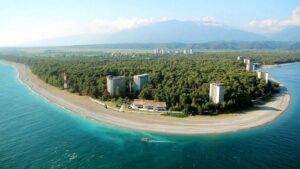
Image: Aerial view of Pitsunda (Source: TripAdvisor)
The Russian position in the discussion is worded crystal clearly by the newly appointed Russian Ambassador to Abkhazia, Mikhail Shurgalin. In one of his most controversial statements, he accused those who oppose the transfer of the Pitsunda dacha with allying themselves with Georgia, the state which is considered to be an immediate threat to their existence by citizens of Abkhazia. Furthermore, he threatened to pull military support and vital economic investments on railroads, airports and other projects from Abkhazia if the parliament fails to ratify the agreement. Further confirming Putin’s interests in Pitsunda dacha, Ambassador Shurgalin emphasized that President Putin needs Pitsunda as part of Russian territory to hold meetings there. Evidenced by these statements, the Russian side does not intend to back down from their demands, but the Abkhazians remain grounded in their will to preserve their sovereignty in the face of what they consider to be a threat to it.
The response to the demands and statements from the Russian Federation has been provided by all corners of Abkhazian society. Among many, war veterans, politicians, political parties, ex-president Raul Khajimba, KAFFED (Federation of the Caucasian Associations, the largest and most prominent North Caucasian organization) and activists released statements opposing the transfer agreement. Committee for the Protection of the Sovereignty of Abkhazia held a press conference against the agreement, which gathered notable public figures, opposition public organizations, deputies of the parliament from the previous term and representatives from veteran organizations in the same space. Their messages were clear and simple: we cannot afford to oppose each other internally, we need to understand what our state needs, we are ready to stand by our President as long as he stands by us, and the necessity for their state to hold its own as an equal to Russia. In the most strongly worded statement, The Forum of National Unity of Abkhazia directly addressed Ambassador Shurgalin, stating that they are not against Russia per se, however the accusations against those who oppose the agreement “clearly crossed the red line” and they will not accept “vassal psychology and servility.”
Apart from reputable figures and organizations of the society, the public also mobilized against the ratification. Protests were organized by the Abkhazian youth. A small child with his school outfit and backpack can be seen signing the petition organized by the opposition against the agreement. A flash-mob was organized by a public movement called “let’s save what has been preserved” and stickers have been printed for motorists. Journalists are constantly discussing the issue. The Abkhaz diaspora in Turkey is watching the events closely. A prominent member of the Abkhaz diaspora in Turkey, Ahmet Hapat has stated that although “currently there are no lobbying attempts in Turkey to mediate the issue”, he joins the sentiments of the Abkhazian public and is “confident that the issue will be handled between Abkhazia and Russia, according to the will of the Abkhazian people.” The public in its entirety, home or abroad is pressuring the parliament and their leaders to halt the ratification of the agreement.
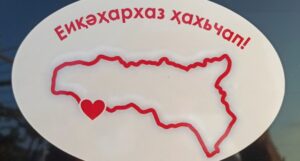
Image: “Let’s save what has been preserved” movement logo (Source: AbkhazWorld)
President Aslan Bzhania toured the country to talk about the transfer agreement in an attempt to explain his position. To him, the transfer is inevitable to maintain good relations with Russia through which “prosperity, peace and tranquility” is achieved in Abkhazia. He is convinced that this is a good decision. Throughout his statements he emphasizes that his position is clear and the further sale of real estate to foreigners is imperative for the Abkhazian economy. To appeal to the respect the Abkhazian people have for President Putin, he revealed that the Russian leader asked him for the transfer “personally.” However, this was not enough to calm the anxiousness in the society, and it manifested itself as a confrontation in Ochamchira. Currently the agreement has been referred to the Constitutional Court of Abkhazia, and the parliament is awaiting a response from them before the ratification meetings begin.
Unrecognized and alone except for the Russians and the Abkhaz diaspora, the prospect of losing a piece of land that consists of a rather large part of Abkhazian soil aggravates an undeniable amount of people in the Abkhazian society. Property and land are essential parts of the idea of sovereignty in Abkhazia. Furthermore, Abkhazians have a deep-rooted culture of dialogue. Roughly translated as “table culture”, the Abkhazians believe in resolving their differences over discussion and conversation. This is how they conducted their affairs with Russia up to this point. The reactions from the Abkhazian society further imply that they would like to have a meaningful dialogue with Russia on how the transfer threatens their understanding of sovereignty. The secretive fashion the agreement was signed in and the disregard of Aslan Bzhania and the Russian side of their voices deeply offend a society which believes so firmly in dialogue between equals. As a state that recognizes Abkhazia, they feel like they are not treated with equal respect by Russia.

Image: T-shirt of a youth protester: “for friendship you don’t pay with land.” (Source: Nuzhnaya Gazeta)
Considering the expansionist actions of Russia and the war in Ukraine, the worries of the Abkhazians might not be entirely ungrounded. In a previous blogpost our authors discussed that “Bzhania might try to weaken the ban” on sales of real estate to foreigners. The firm position of the President indicates that this prediction might be true, as the Abkhazians rightfully fear. What will stop the Russians from demanding and obtaining more land if this transfer is realized? Furthermore, if Russians start to purchase land in Abkhazia with the economic power they possess relative to this small de facto state, the entire Abkhazian coastline which is the heart of tourism in Abkhazia might be transferred to the Russians in the blink of an eye. The firm stance of the public in the Pitsunda issue stems from a motivation to avoid such disastrous prospects. In terms of what might happen next, Ahmet Hapat had some interesting ideas. He firmly stated that: “Russia will remember what Abkhazia means to them when searching for a resolution to this issue. If Abkhazia had not chosen independence, they would now have been a part of Georgia which is on good terms with NATO and the EU. We paid a heavy price for our independence and because of that now they have an ally with 240 kms of shores on the Black Sea. They will not forget that.”
Author: Izzet Yalin Yüksel


